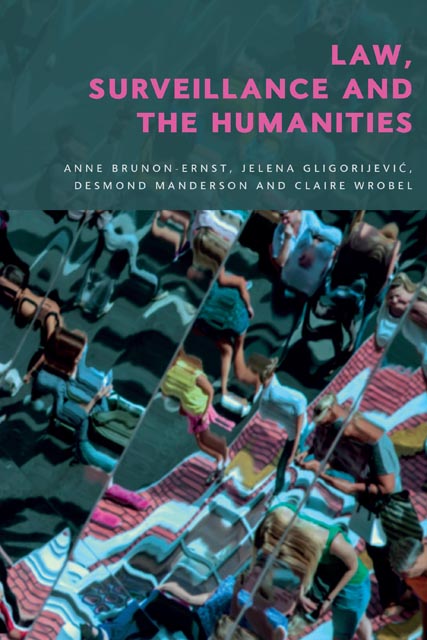8 - Space and Surveillance in Jonathan Raban’s Novel Surveillance (2006)
Published online by Cambridge University Press: 18 November 2023
Summary
I. Introduction
It is no surprise that surveillance, today recognised as an unmistakable field of study, is also a topic widely addressed in post-9/11 literature. As Brunon-Ernst explains in Chapter 6 of this volume, the first wave of scholarship on surveillance and literature dates from shortly after the publication of Foucault's Discipline and Punish in 1975. Some of the best-known works are that of John Bender, Imagining the Penitentiary, published in 1987, and that of D. A. Miller, The Novel and the Police, published in 1988. Miller declares that his work ‘centres not on the police, in the modern institutional shape they acquire in Western liberal culture during the nineteenth century, but on the ramification within the same culture of less visible, less visibly violent modes of “social control”’. As Mark Vareschi underlines, ‘[t]aking the establishment of the modern police force in the nineteenth century as the historical backdrop, Miller argues for the novel's engagement in regimes of disciplinary power’. As for Bender, he states that ‘art, culture, and society are not separate or separable’ and that ‘[n]ovels as [he] describe[s] them are primary historical and ideological documents; the vehicles, not the reflections, of social change.’ In his work, he takes a closer look at how prison and the penitentiary come to share concerns with the novel.
More recently, in The Watchman in Pieces: Surveillance, Literature, and Liberal Selfhood, Rosen and Santesso explore the idea that ‘surveillance and literature, as kindred practices, have light to shed on each other – on each other's theory, mode of operation, and ways of grappling, as it were, with the reality principle’. In Spaces of Surveillance: States and Selves, Susan Flynn and Antonia Mackay take a closer look at how surveillance affects the space one inhabits and has an impact on one's identity. The authors state that ‘[t]he potential contained in surveillant technologies is […] twofold: providing bodies with identities they may not want, but at the same time providing them with an identity that can be determined as real – I am watched, therefore I am.’ Taking an interest in photography, art and literature, the authors of this collection offer ‘a unique insight into the ways in which bodies have both voluntarily and involuntarily been shaped and defined by changing technology’.
- Type
- Chapter
- Information
- Law, Surveillance and the Humanities , pp. 151 - 168Publisher: Edinburgh University PressPrint publication year: 2023



